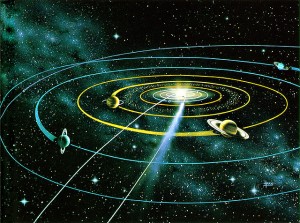Claytonian Time

I don’t mean to be telling tales out of school, but friend and fellow Mepper, Storily Clayton, once shared with me a theory of time that I found both brilliant and strangely comforting.
The idea is as follows: If we think of time as the position of the Earth in relation to the Sun (which is how we typically measure a year), any given time is actually a very specific geographical position in the Earth’s orbit. In other words, the Earth is in a nearly identical spot today as it was a year ago. And so am I, and so are you, as are all other passengers on the giant blue sphere as it careens through space. We are constantly traveling through “time” at over 66,000 miles per hour around an orbital track over 585 million miles long.
This gives a strangely physical or spatial quality to time. And lends a lot more credence to the relativists’ notion of Space/Time as a single entity.
It also warrants a new type of observation. Are we prone to certain behaviors or actions at certain times of the year because we find ourselves in the same geographical location?
I mean, think about how returning to a formative location (a school you graduated from, a house you spent your childhood, a old familiar dive bar) affects your thoughts and brings back certain old lines of thinking, certain memories.
Now realize that visits to those locations are randomly strewn about space; each visit to the school (that wasn’t an anniversary of another visit) could have taken place hundreds of thousands of miles apart from each other (in the context of where you are in space). Relatively speaking, the only time when you’re anywhere near in the same place as you had been before, is on the yearly anniversary of a given day. Even if you are on the other side of the planet (having a circumference of about 25,000 miles) on that anniversary you’re still much closer to your location on that anniversary than a half hour later, when you’ve moved another 30,000 miles down the orbital track.
So Mr. Clayton often uses his blog as an empirical analysis of how different times tend to affect him. And I’ve begun to buy into this line of thinking. I just re-listened to Mep Report 18, an absolutely phenomenal specimen that we recorded almost exactly three years ago. And I listened to myself wrestle with life questions that have been occurring to me very recently. I suppose I can only truly be in the same mental “space” as I was for TMR 18 during this time of year.
Some food for thought.




[…] For more on the geographical aspects of time, see Claytonian Time. […]